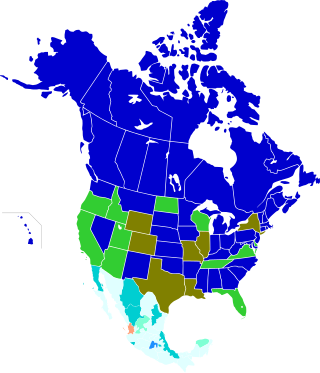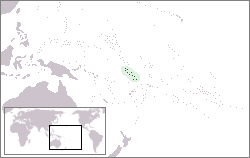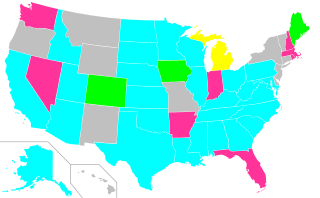Related Research Articles

The Riot Act, sometimes called the Riot Act 1714 or the Riot Act 1715, was an act of the Parliament of Great Britain which authorised local authorities to declare any group of 12 or more people to be unlawfully assembled and order them to disperse or face punitive action. The act's full title was "An Act for preventing tumults and riotous assemblies, and for the more speedy and effectual punishing the rioters", and it came into force on 1 August 1715. It was repealed in England and Wales by section 10(2) and Part III of Schedule 3 of the Criminal Law Act 1967. Acts similar to the Riot Act passed into the laws of British colonies in Australia and North America, some of which remain in force today.

Abortion in the United Kingdom is de facto available under the terms of the Abortion Act 1967 in Great Britain and the Abortion (No.2) Regulations 2020 in Northern Ireland. The procurement of an abortion remains a criminal offence in Great Britain under the Offences Against the Person Act 1861, although the Abortion Act provides a legal defence for both the pregnant woman and her doctor in certain cases. Although a number of abortions did take place before the 1967 Act, there have been around 10 million abortions in the United Kingdom. Around 200,000 abortions are carried out in England and Wales each year and just under 14,000 in Scotland; the most common reason cited under the ICD-10 classification system for around 98% of all abortions is "risk to woman's mental health."
Abortion in Ireland is regulated by the Health Act 2018. Abortion is permitted in Ireland during the first twelve weeks of pregnancy, and later in cases where the pregnant woman's life or health is at risk, or in the cases of a fatal foetal abnormality. Abortion services commenced on 1 January 2019, following its legalisation by the aforementioned Act, which became law on 20 December 2018. Previously, the 8th Constitutional Amendment had given the life of the unborn foetus the same value as that of its mother, but the 36th constitutional amendment, approved by referendum in May 2018, replaced this with a clause permitting the Oireachtas (parliament) to legislate for the termination of pregnancies.

Abortion laws vary widely among countries and territories, and have changed over time. Such laws range from abortion being freely available on request, to regulation or restrictions of various kinds, to outright prohibition in all circumstances. Many countries and territories that allow abortion have gestational limits for the procedure depending on the reason; with the majority being up to 12 weeks for abortion on request, up to 24 weeks for rape, incest, or socioeconomic reasons, and more for fetal impairment or risk to the woman's health or life. As of 2022, countries that legally allow abortion on request or for socioeconomic reasons comprise about 60% of the world's population. In 2024, France became the first country to explicitly protect abortion rights in its constitution.

The Offences against the Person Act 1861 is an Act of the Parliament of the United Kingdom of Great Britain and Ireland. It consolidated provisions related to offences against the person from a number of earlier statutes into a single Act. For the most part these provisions were, according to the draftsman of the Act, incorporated with little or no variation in their phraseology. It is one of a group of Acts sometimes referred to as the Criminal Law Consolidation Acts 1861. It was passed with the object of simplifying the law. It is essentially a revised version of an earlier consolidation act, the Offences Against the Person Act 1828, incorporating subsequent statutes.
Murder is an offence under the common law legal system of England and Wales. It is considered the most serious form of homicide, in which one person kills another with the intention to unlawfully cause either death or serious injury. The element of intentionality was originally termed malice aforethought, although it required neither malice nor premeditation. Baker, chapter 14 states that many killings done with a high degree of subjective recklessness were treated as murder from the 12th century right through until the 1974 decision in DPP v Hyam.

R v Davidson, also known as the Menhennitt ruling, was a significant ruling delivered in the Supreme Court of Victoria on 26 May 1969. It concerned the legality of abortion in the Australian state of Victoria. The ruling was not the end of the case, but rather answered certain questions of law about the admissibility of evidence, so as to allow the trial to proceed.

In North America, the legal age of consent relating to sexual activity varies by jurisdiction.

The Criminal Law Act 1967 is an Act of the Parliament of the United Kingdom that made some major changes to English criminal law, as part of wider liberal reforms by the Labour government elected in 1966. Most of it is still in force.

The monarchy of Saint Kitts and Nevis is a system of government in which a hereditary monarch is the sovereign and head of state of Saint Kitts and Nevis. The current monarch of Saint Kitts and Nevis, since 8 September 2022, is King Charles III. As sovereign, he is the personal embodiment of the Crown of Saint Kitts and Nevis. Although the person of the sovereign is equally shared with 14 other independent countries within the Commonwealth of Nations, each country's monarchy is separate and legally distinct. As a result, the current monarch is officially titled King of Saint Christopher and Nevis and, in this capacity, he and other members of the royal family undertake public and private functions domestically and abroad as representatives of Saint Kitts and Nevis. However, the King is the only member of the royal family with any constitutional role.
In common law jurisdictions, statutory rape is nonforcible sexual activity in which one of the individuals is below the age of consent. Although it usually refers to adults engaging in sexual contact with minors under the age of consent, it is a generic term, and very few jurisdictions use the actual term statutory rape in the language of statutes. In statutory rape, overt force or threat is usually not present. Statutory rape laws presume coercion because a minor or mentally disabled adult is legally incapable of giving consent to the act.

The Offences Against the Person Act 1828 was an Act of the Parliament of the United Kingdom of Great Britain and Ireland. It consolidated provisions in the law related to offences against the person from a number of earlier statutes into a single Act. It was part of the criminal law reforms known collectively as "Peel's Acts", passed with the objective of simplifying the law. Among the laws it replaced was clause XXVI of Magna Carta, the first time any part of Magna Carta was repealed, and the Buggery Act 1533. It also abolished the crime of petty treason.

The Crimes Act 1961 is an act of New Zealand Parliament that forms a leading part of the criminal law in New Zealand. It repeals the Crimes Act 1908, itself a successor of the Criminal Code Act 1893. Most crimes in New Zealand are created by the Crimes Act, but some are created elsewhere. All common law offences are abolished by section 9, as are all offences against acts of the British Parliaments, but section 20 saves the old common law defences where they are not specifically altered.
Child destruction is the name of a statutory offence in England and Wales, Northern Ireland, Hong Kong and in some parts of Australia.
Abortion in Liechtenstein is illegal in most circumstances with limited exceptions in cases where the life of the pregnant woman is at risk, or where the pregnancy has resulted from a sexual offence. Religion in Liechtenstein is mainly Roman Catholic, which is reflected in the faith of the ruling Princely House of Liechtenstein and in the country's laws and culture around pregnancy.

Lesbian, gay, bisexual, and transgender (LGBT) people in Tuvalu face legal difficulties not experienced by non-LGBT residents. Sections 153, 154 and 155 of the Penal Code outlaw male homosexual intercourse with a penalty of up to 14 years in prison, but the law is not enforced. Employment discrimination on the basis of sexual orientation has been banned since 2017. Since 2023, the Constitution of Tuvalu has banned same-sex marriage.
Foeticide, or feticide, is the act of killing a fetus, or causing a miscarriage. Definitions differ between legal and medical applications, whereas in law, feticide frequently refers to a criminal offense, in medicine the term generally refers to a part of an abortion procedure in which a provider intentionally induces fetal demise to avoid the chance of an unintended live birth, or as a standalone procedure in the case of selective reduction.

Born alive laws in the United States are fetal rights laws that extend various criminal laws, such as homicide and assault, to cover unlawful death or other harm done to a fetus in utero or to an infant that has been delivered. The basis for such laws stems from advances in medical science and social perception, which allow a fetus to be seen and medically treated as an individual in the womb and perceived socially as a person, for some or all of the pregnancy.
Abortion in Tonga is severely restricted by criminal law, as nearly all abortions are illegal. Abortions are illegal in Tonga, unless medical authorities cite preservation of maternal health.
The Indian community in Saint Kitts and Nevis is made up of Indo-Kittitians, Indo-Nevisians, non-resident Indians and persons of Indian origin. Indo-Kittitians and Indo-Nevisians are nationals of Saint Kitts and Nevis whose ancestry lies within the country of India. The community originated from the Indian indentured workers brought to Saint Kitts and Nevis by the British in 1861 and 1874 respectively. By 1884, most of the community had emigrated to Caribbean nations with larger Indian populations such as Trinidad and Tobago, Guyana and Suriname.
References
- 1 2 Abortion Policies: A Global Review. Vol. 3. United Nations. 2001. p. 63. ISBN 978-92-1-151365-3.
- 1 2 "Saint Kitts and Nevis". Berkman Center for Internet & Society, Harvard University. Retrieved 10 May 2016.
- ↑ Guillaume, Agnès; Lerner, Susana (2007). "Specific Characteristics of Abortion Legislation in Some Countries in the Region". Abortion in Latin America and the Caribbean: A Review of the Literature from 1990 to 2005. CEPED. Archived from the original on 2015-09-08. Retrieved 10 May 2016.
- ↑ Pheterson, G.; Azize, Y. (2005). "Abortion practice in the northeast Caribbean: "Just write down stomach pain"". Reproductive Health Matters. 13 (26): 44–53. doi: 10.1016/S0968-8080(05)26201-8 . PMID 16291485.